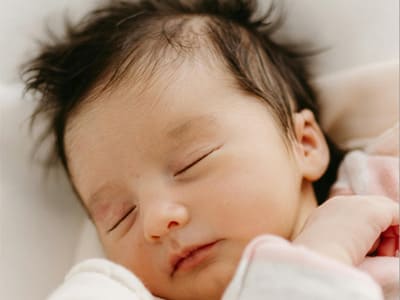Sleep of the children and their parents

How do the sleep patterns of parents and their newborn child evolve in the first years of life? What are the father-mother-child interrelationships?
Using data from the SEPAGES cohort, we recently identified specific sleep characteristics for fathers, mothers and couples in the early years of their newborn's life, and also showed that mothers tended to adopt their partner's sleep habits (Sleep of the parents). In this new study, we analyzed the interrelationships between the sleep characteristics of both parents and those of their children. The objectives were to:
- to identify groups of children with different sleep habits from birth to age 5
- to evaluate the relationships between the groups of children, and those previously identified of mothers, fathers and couples.
How to characterize children's sleep?
Volunteer parents in the cohort answered questionnaires about their child's sleep at 3 months, 12 months, 3 years and 5 years. The answers to the questions were used to calculate, for each child: the duration of nocturnal sleep, duration of daytime sleep (nap), subjective sleep loss, difficulty falling asleep, nocturnal awakenings.
Main results
We identified 3 groups of children with sleep characteristics specific to each group: a group with no sleep disorders, a group with moderate disorders and a group with significant disorders (short sleep durations, high frequency of difficulty falling asleep and waking up at night).
Assessment of the relationships between these groups and those of the parents showed that mothers with the most sleep disorders more frequently had children with more sleep disorders themselves, while mothers in the other groups more frequently had children in the group with no sleep disorders. On the other hand, no relationship was observed with the fathers' or couples' sleep groups.
Why is this study innovative?
This study allows us to better characterize the relationship between parents' and children's sleep during the first years of life, through several sleep measures considered simultaneously. Our results suggest that mothers are more sensitive than fathers to their child's sleep, or that mothers are more involved with their child than fathers. Combined with the results of the previous study, our research suggests that mothers tend to adapt their sleep habits to those of other family members (partner, child).
To go further: Mihyeon Kim, Sarah Lyon-Caen, Sam Bayat, Claire Philippat, Sabine Plancoulaine. “Intrafamilial associations of sleep multitrajectory groups between ages of 3 and 60 months in the SEPAGES cohort; Sleep Health ”. December 2024
Read the article